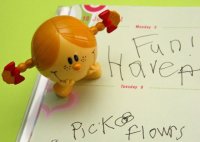The Secret to Making It a Great School Year
If I could, I'd lay money on the claim I'm about to make: If you do the one little thing I'm about to suggest, you will have a great school year. Here it is:
At the end of every day, identify three things that went well in your classroom. That's part one -- what went well? When did you see indicators that your students were learning? That they were happy to be in school?
And part two: For each thing that went well, what was your role in it? What action did you take that resulted in the positive outcome?
Let's say, for example, that the thing that went well was that the first day of school was calm and everything went as planned. When you explore your role in this successful first day, you might name that your lesson plans were three pages long, your materials were all organized five days before, and you got a good eight hours of sleep the night before.
This exercise can be done mentally, perhaps on the drive home. It is even more powerful if it's written down and you compile a record of these daily successes throughout the year. And finally, it can also have a tremendous impact if it's verbalized -- perhaps shared with a colleague as an end-of-day ritual together. The key is that it becomes a habit of mind.
So what is this habit and why is it important?
This habit trains your mind to find the positive in every day and to identify your own agency in creating that positive. Rick Hanson, the author of The Buddha's Brain: The Practical Neuroscience of Happiness, Love and Wisdom, describes our brains as "like Velcro" for negative experiences -- we dwell on them, and "like Teflon" for positive experiences -- they slide right out of our minds. Our minds are practically programmed to notice and remember the things that aren't working -- and as teachers we know there are plenty of those each day. The little successes, growth, and positive moments are washed away by the tidal waves of what's not working in schools.
As the waves of what's-not-working batter us day after day, our emotional resilience erodes. We burn out. The practice I'm suggesting can be as an antidote. It won't resolve all the problems we deal with in schools, but it can help us build emotional fortitude so that we maintain our energy. If every day, you can identify what's going well within your sphere of influence, and how your actions resulted in those going-well moments, you might have a very different kind of school year than you've ever had. Try it!
